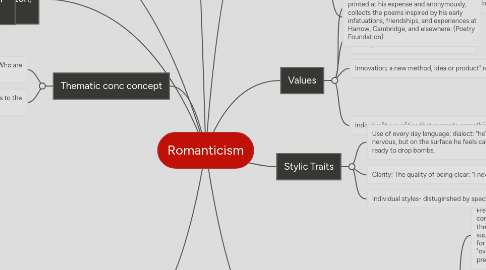Romanticism
por Christian with Pierro on the beat


1. Daniels, Harvey et al. Elements Of Literature. 1st ed. Austin, Tex.: Holt, Rinehart and Winston, 2008. Print.
2. "Lord Byron (George Gordon)." Poetry Foundation. Poetry Foundation, n.d. Web. 14 Feb. 2017. "Romanticism." Romanticism - New World Encyclopedia. N.p., 2 July 2015. Web. 14 Feb. 2017. "Dark Romanticism." Dark Romanticism - New World Encyclopedia. N.p., n.d. Web. 14 Feb. 2017. "Characteristics of Romanticism." Revolution & Romanticism (n.d.): n. pag. Read Write Think. Web. "The Romantic Victor Marie Hugo." Mtholyoke.edu. N.p., n.d. Web. 14 Feb. 2017. "Individualism: The Romantic Hero." Research Gate. N.p., Nov. 2013. Web.
3. mood, tone, and voice
3.1. Emotional: "It stressed strong emotion as a source of aesthetic experience, placing emphasis on such emotions as trepidation, horror, and the awe experienced in confronting the sublimity of nature." (New World Encyclopedia)
3.2. Energetic: "Revival of ancient myths, customs and traditions by Romantic poets and painters helped to distinguish their indigenous cultures from those of the dominant nations (Russians, Germans, Austrians, Turks, etc.). Patriotism, nationalism, revolution and armed struggle for independence also became popular themes in the arts of this period. Arguably, the most distinguished Romantic poet of this part of Europe was Adam Mickiewicz"(New World Encyclopedia)
3.3. Improbable: "The Napoleon that saw his contemporaries was not “an actual Napoleon” a real figure, but rather an iconic and unique character, an embodiment of individualism and will." (New World Encyclopedia)
3.4. Changing: "The nature of nationalism changed dramatically, however, after the French Revolution, with the rise of Napoleon, and the reactions in other nations." (New World Encyclopedia)
3.5. Visionary: William Wordsworth and Samuel Taylor Coleridge, whose co-authored book Lyrical Ballads (1798) sought to reject Augustan poetry in favor of more direct speech derived from folk traditions. (New World Encyclopedia)
3.6. Fantastic: "the Dark Romantics adapted images of anthropomorphized evil in the form of Satan, devils, ghosts … vampires, and ghouls." (New World Encyclopedia)
3.7. Chaotic: "For these Dark Romantics, the natural world is dark, decaying, and mysterious; when it does reveal truth to man, its revelations are evil and hellish." (New World Encyclopedia)
3.8. Supernatural: "Fallen man's inability fully to comprehend haunting reminders of another, supernatural realm that yet seemed not to exist, the constant perplexity of inexplicable and vastly metaphysical phenomena" (New World Encyclopedia)
4. Philosophy/ Conmectim
4.1. Reaction against classic; created due to feeling of the limits of reason
4.2. Reaction to the enlightenment; realism came out of the enlightenment which also created romanticism
4.3. Congrats with realism;"there had to be limits to reason
4.4. Objectivism vs subjectiveism; objectivism is a person who follows moral guide lines. Subjection is knowledge
4.5. Idealism vs materialism: idealism is unrealistic ideas while materialism is nothing exist except matter for and it's movements and modifications
4.6. Neoclassicism;classical literature drawn inspiration from Ancient Greek and Rome
5. Thematic conc concept
5.1. Nature is materlism " I am a nobody. Who are you? Are you a nobody, too?
5.2. Nature is mystical;" nature held truths to the questions & problems of life"
6. Values
6.1. Subjective experience; existing in the mind belonging to the object of thought "romantics put a emphasis on feeling"
6.2. Imagination; the ability to be creative or resourceful "the journey away from the corruption"
6.3. Innovation; a new method, idea or product" romanticism came about due to the thought the rational mind could not reach
6.4. Individuality; qualities that separate something from other things alike it
6.4.1. Individual self; valued poetry it allowed to use one self imagination
6.4.2. Individual expression; expression of inner self "preferred youthful innocence over educated sophtication
6.4.3. Importance of emotions" valued feelings & intuition over read m "follow your heart not your head"
